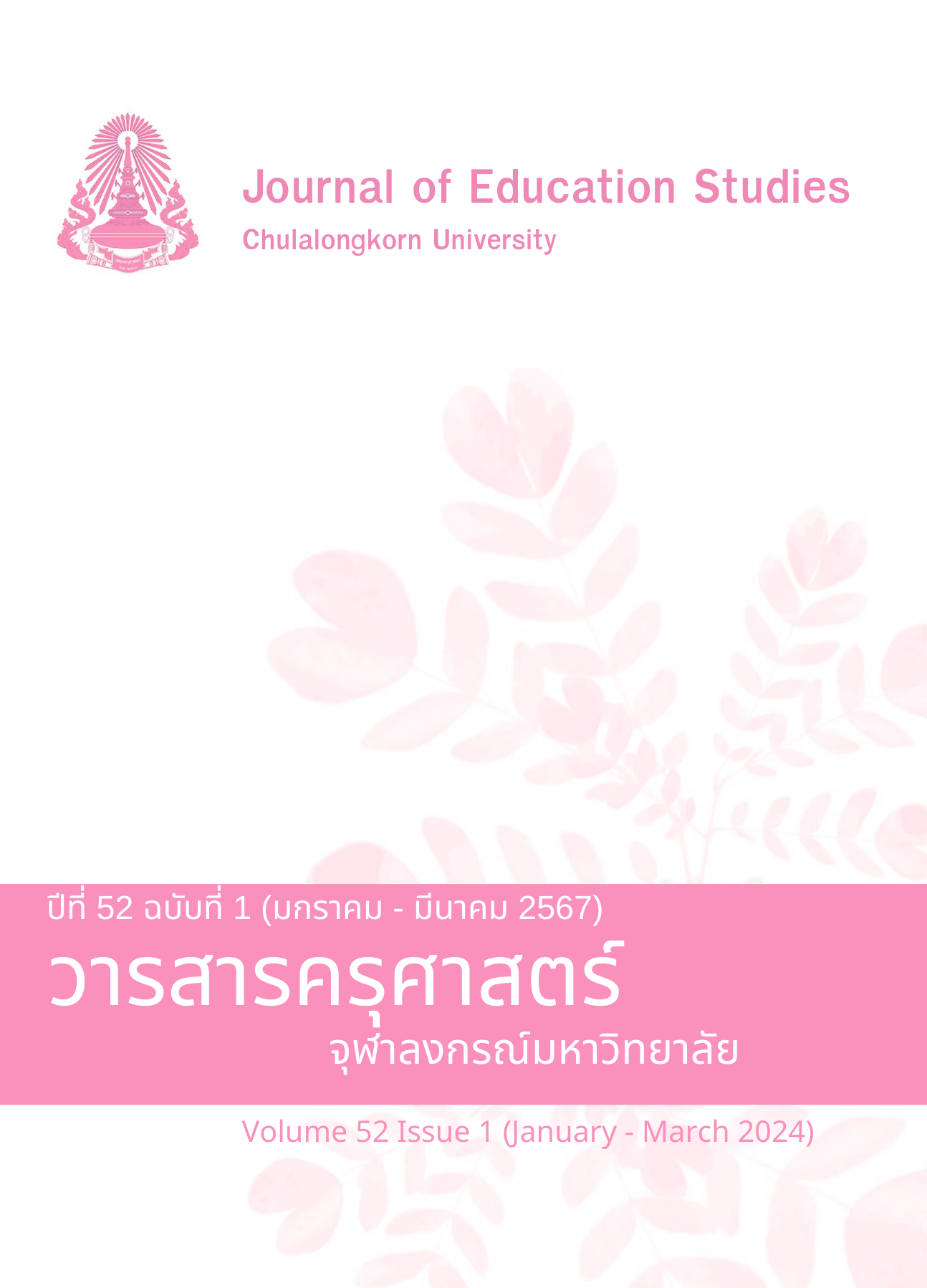การพัฒนาบทเรียนดนตรีออนไลน์แบบห้องเรียนกลับด้าน เรื่อง หลักและวิธีการขับร้องเพลงไทย สำหรับผู้เรียนระดับประถมศึกษา
DOI:
https://doi.org/10.14456/educu.2024.17คำสำคัญ:
บทเรียนดนตรีออนไลน์, ห้องเรียนกลับด้าน, หลักและวิธีการขับร้องเพลงไทยบทคัดย่อ
การวิจัยครั้งนี้มีวัตถุประสงค์เพื่อ 1) เพื่อพัฒนาและหาประสิทธิภาพของบทเรียนดนตรีออนไลน์แบบห้องเรียนกลับด้าน2) เพื่อเปรียบเทียบผลสัมฤทธิ์ทางการเรียนของผู้เรียนก่อนและหลังเรียน จากบทเรียนดนตรีออนไลน์แบบห้องเรียนกลับด้าน และ 3) เพื่อประเมินความพึงพอใจของผู้เรียนที่มีต่อบทเรียนดนตรีออนไลน์แบบห้องเรียนกลับด้าน การวิจัยนี้เป็นการวิจัยเชิงทดลองเบื้องต้น โดยใช้รูปแบบการทดลองกลุ่มเดียว ทดสอบก่อนเรียนหลังเรียน กลุ่มเป้าหมายคือ ผู้เรียนชั้นประถมศึกษาปีที่ 6 ปีการศึกษา 2566 โรงเรียนบ้านหนองลีวิทยาคม จำนวน 20 คน โดยการเลือกแบบเจาะจง เครื่องมือที่ใช้ในการวิจัย ได้แก่ บทเรียนดนตรีออนไลน์เรื่องหลักและวิธีขับร้องเพลงไทย จำนวน 10 บทเรียน แบบทดสอบก่อนเรียน-หลังเรียน แบบประเมินทักษะปฏิบัติ แบบประเมินผลการเรียนรู้ตามสภาพจริง และแบบประเมินความพึงพอใจ สถิติที่ใช้ในการวิเคราะห์ข้อมูล ได้แก่ ค่าเฉลี่ย ส่วนเบี่ยงเบนมาตรฐาน ทดสอบค่าที และการทดสอบประสิทธิภาพตามเกณฑ์ E1/E2 = 80/80 ผลการวิจัย พบว่า 1) บทเรียนดนตรีออนไลน์ แบบห้องเรียนกลับด้านมีประสิทธิภาพ เท่ากับ 80.32/83.75 ซึ่งเป็นไปตามเกณฑ์ที่กำหนดไว้ 2) ผลสัมฤทธิ์หลังเรียนที่ได้เรียนจากบทเรียนดนตรีออนไลน์ แบบห้องเรียนกลับด้านสูงกว่าคะแนนก่อนเรียน อย่างมีนัยสำคัญทางสถิติที่ระดับ 0.05 และ 3) ความพึงพอใจต่อการจัดกิจกรรมการเรียนรู้ อยู่ในระดับมากที่สุด
เอกสารอ้างอิง
ภาษาไทย
กิตติภัค วรชินา, สุริยะ วชิรวงศ์ไพศาล, ดรุณี ปัญจรัตนากร, และ พงษ์ศักดิ์ ผกามาศ. (2566). การพัฒนาแพลตฟอร์มการจัดการเรียนรู้ออนไลน์วิชาดนตรีโดยใช้เทคนิคของโคดายร่วมกับการเรียนรู้ร่วมกันสำหรับนักเรียนชั้นประถมศึกษาปีที่ 6. วารสารการศึกษาและนวัตกรรมการเรียนรู้, 3(1), 53-70.
ทิศนา แขมมณี. (2563). ศาสตร์การสอน: องค์ความรู้เพื่อการจัดกระบวนการเรียนรู้ที่มีประสิทธิภาพ. (พิมพ์ครั้งที่ 24). สำนักพิมพ์แห่งจุฬาลงกรณ์มหาวิทยาลัย.
บุญชม ศรีสะอาด. (2560). การวิจัยเบื้องต้น. พิมพ์ครั้งที่ 10. สุวีริยาสาส์น.
เบญจพร ตีระวัฒนานนท์. (2563). การพัฒนาบทเรียนออนไลน์ตามแนวคิดห้องเรียนกลับด้าน เรื่อง การสร้างภาพกราฟิกโดยโปรแกรมนำเสนอ สำหรับนักเรียนชั้นประถมศึกษาตอนปลาย. [วิทยานิพนธ์การศึกษามหาบัณฑิต, มหาวิทยาลัยบูรพา]. web opac. https://digital_collect.lib.buu.ac.th/dcms/files/58920713.pdf.
พระราชบัญญัติการศึกษาแห่งชาติ พ.ศ. 2542 ที่แก้ไขเพิ่มเติม (ฉบับที่ 3) พ.ศ. 2553. (2553, 22 กรกฎาคม). ราชกิจจานุเบกษา. เล่ม 127 ตอนที่ 45 ก. หน้า 1-3.
พระมหาจักรพล สิริธโร. (2564). การศึกษาในยุค New Normal. Journal of Modern Learning Development, 6(6), 346-356.
พิชิต ฤทธิ์จรูญ. (2556). หลักการวัดและประเมินผลการศึกษา. (พิมพ์ครั้งที่ 8). บริษัท เฮ้าส์ ออฟ เคอร์มิสท์ จํากัด.
ภากร เทียนทิพย์การุณย์. (2561). การศึกษาผลการเรียนรู้ตามแนวคิดห้องเรียนกลับด้านร่วมกับการจัดการเรียนรู้ที่เน้นการพัฒนาทักษะการปฏิบัติ หน่วยการเรียนรู้ ขลุ่ยบรรเลงเพลงเสนาะ ของนักเรียนชั้นมัธยมศึกษาปีที่ 3. [วิทยานิพนธ์ครุศาสตรมหาบัณฑิต, มหาวิทยาลัยราชภัฏนครราชสีมา]. ThaiLIS. https://tdc.thailis.or.th/tdc/search_result.php.
รัชนู พิมพิทักษ์. (2560). ทักษะการปฏิบัติงานศิลปะ และความใฝ่รู้ใฝ่เรียนของนักเรียน ชั้นมัธยมศึกษาปีที่ 1 โรงเรียนสวนกุหลาบวิทยาลัย ที่เรียนรู้ด้วยการจัดการเรียนรู้แบบห้องเรียนกลับด้าน และการจัดการเรียนรู้แบบสาธิต. [วิทยานิพนธ์มหาบัณฑิต, มหาวิทยาลัยราชภัฏธนบุรี]. ThaiLIS. https://tdc.thailis.or.th/tdc/search_result.php.
วิจารณ์ พานิช. (2557).ครูเพื่อศิษย์สร้างห้องเรียนกลับทาง. (พิมพ์ครั้งที่ 2). บริษัท เอส. อาร์. พริ้นติง แมสโปรดักส์ จำกัด.
ศิริชัย กาญจนวาสี. (2552). ทฤษฎีการทดสอบแบบดั้งเดิม. (พิมพ์ครั้งที่ 6). โรงพิมพ์แห่งจุฬาลงกรณ์มหาวิทยาลัย.
สำนักงานเลขาธิการสภาการศึกษา. (2565). มาตรการฟื้นฟูภาวะถดถอยทางการเรียนรู้. บริษัท เอส. บี. เค. การพิมพ์ จำกัด.
สุธาสินี ถีระพันธ์. (2566). การพัฒนารูปแบบการเรียนการสอนรายวิชาปฏิบัติทักษะดนตรีออนไลน์สำหรับนิสิตระดับปริญญาตรี วิทยาลัยดุริยางคศิลป์ มหาวิทยาลัยมหาสารคาม. วารสารมนุษยศาสตร์และสังคมศาสตร์ มหาวิทยาลัยนครพนม, 19(1), 173-188.
อนุธิดา เดชแฟง. (2562). การจัดการเรียนรู้แบบห้องเรียนกลับด้าน ผ่าน Facebook ร่วมกับการ เรียนรู้แบบเครื่องมือการคิด เพื่อพัฒนาทักษะกาคิดวิเคราะห์ สำหรับนักเรียนชั้นมัธยมศึกษาปีที่ 2 โรงเรียนเทศบาลวัดไทยชุมพล (ดำรงประชาสรรค์). [วิทยานิพนธ์ครุศาสตรมหาบัณฑิต, มหาวิทยาลัยราชภัฏพิบูลสงคราม]. ThaiLIS. https://tdc.thailis.or.th/tdc/search_result.php.
อนุศร หงส์ขุนทด. (2558). การพัฒนารูปแบบระบบการเรียนแบบห้องเรียนกลับด้านผ่านสื่อ 3 แบบ ด้านทักษะดนตรีสำหรับนักเรียนชั้นมัธยมศึกษา. [วิทยานิพนธ์ปรัชญาดุษฎีบัณฑิต, มหาวิทยาลัยเกษตรศาสตร์]. ThaiLIS. https://tdc.thailis.or.th/tdc/search_result.php.
ภาษาอังกฤษ
Bloom, B. S., et al. (1956). Taxonomy of Educational Objectives: Cognitive and Affective Domains. David McKay.
ดาวน์โหลด
เผยแพร่แล้ว
รูปแบบการอ้างอิง
ฉบับ
ประเภทบทความ
สัญญาอนุญาต

อนุญาตภายใต้เงื่อนไข Creative Commons Attribution-NonCommercial-NoDerivatives 4.0 International License.




